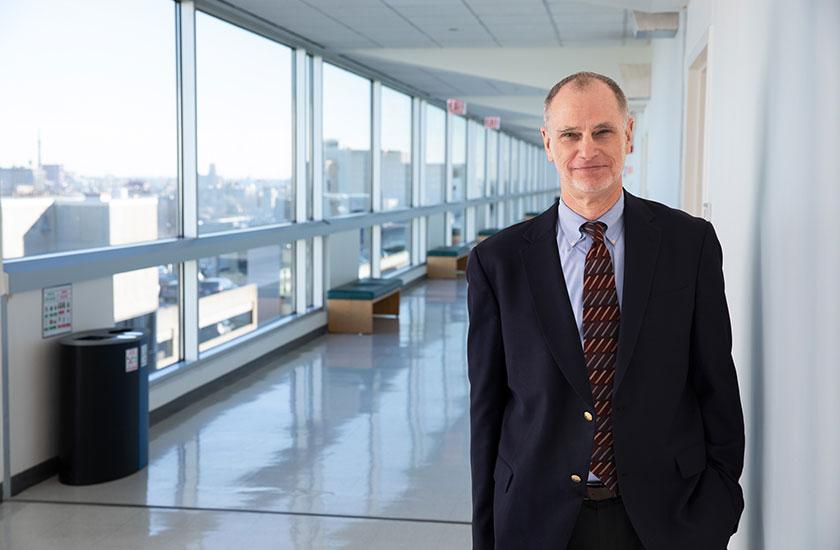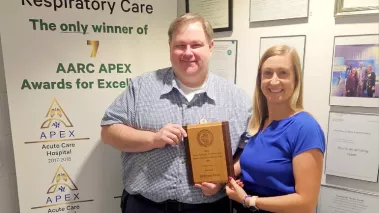People often turn to spiritual support in times of crisis, including grave illness or the prospect of dying. When it comes to providing solace, chaplains in health care play a significant part, and George Fitchett, DMin, PhD, has largely dedicated his career to clarifying that role.
Fitchett, professor and director of research in the Department of Religion, Health and Human Values at Rush University’s College of Health Sciences, is a pioneer in the effort to use research to assess the effectiveness of spiritual care in hospitals and other health care settings. The research program he developed at Rush in the early 1990s was "the first sustained effort to develop and use research to improve spiritual care in any chaplaincy department in the United States," he says.
"Some of the ways people use spirituality are more effective than others," says Fitchett, who has spent his whole career at Rush. He first became interested in working as a chaplain during an internship at Rush that was a required part of his theological training.
A respectful assessment of spiritual care is possible
Decades ago, Fitchett says, he would have said "the things that are important about our work can't be measured" — people's religious or spiritual needs, for example, or the extent spiritual care helps people cope, or enhance their emotional well-being, quality of life or sense of peace.
But Fitchett, who is originally from New York City and is a Quaker, was intrigued by research from the beginning of his chaplaincy career. He regularly attended grand rounds and research presentations at Rush and came to the conclusion that these investigations were so central to effective health care that chaplains working in hospital settings eventually would be at a disadvantage if they couldn't express themselves in "the language of research."
He says, “I kept thinking, 'Is there a way we could do research about spiritual care?'"
When he came across investigations that had been done in the psychology of religion, Fitchett realized those researchers were indeed developing measures for spiritual concerns, and that it was possible to thoughtfully and respectfully assess what spirituality can contribute — and which approaches might work best. Research could also direct professional training and provide chaplains with a way to present their accomplishments to medical colleagues and to the public. He wanted to be part of that.
Fitchett became one of the first health care chaplains to participate in research centered on the role of religion and spirituality in coping with illness and other life crises. That was at a time when there was little precedent and no training available for such projects.
Beginning in 1990, he spent a decade collaborating with experienced researchers until Lynda Powell, PhD, chairperson of the Department of Preventive Medicine at Rush, suggested he apply for a training grant from the National Institutes of Health. He did, and in 2002 he became the first chaplain to receive an NIH career development grant and began pursuing a PhD in epidemiology at the University of Illinois School of Public Health in Chicago.
By the time Fitchett obtained his degree in 2007, health care chaplains were widely recognizing the importance of making research part of their work. Fitchett was in a position to provide national leadership for a new movement.
Spiritual assessment is one area of Fitchett’s research and expertise. His first book, published in 1993, was titled Assessing Spiritual Needs.
From the first minute they walk into any patient's hospital room, "chaplains have been doing these assessments intuitively," Fitchett says. The objective of the new research-based approach is to improve care by making chaplains’ spiritual assessments explicit and comprehensive, and "not based on individual chaplains' preferences and style." It will take a while to develop best practices, though, he says.
Dignity therapy shows promise as a tool for chaplains
Fitchett has continued to do his own research, most recently investigating whether chaplains delivering dignity therapy — a "life review conversation" designed to help patients in palliative care put the events, lessons and relationships of their lives into context and share them with loved ones — could improve their spiritual and emotional well-being. Fitchett thinks dignity therapy, which was not originally developed as a spiritual intervention, could be a valuable tool for hospital chaplains.
Fitchett is a co-principal investigator for the study, which is funded by the National Cancer Institute and the National Institute for Nursing Research. The study is looking at more than 500 patients with cancer at six U.S. hospitals.
A control group will not receive dignity therapy, though those patients will receive usual palliative care. The study has been underway for more than a year, but final results won't be available for another three or four years.
This NIH-funded grant is "an important step in demonstrating the quality and rigor that can go into spiritual-care research," he says.
Changing the culture of chaplaincy education
Fitchett also co-founded Transforming Chaplaincy, a joint project created four years ago with Wendy Cadge, PhD, professor of sociology at Brandeis University in Waltham, Massachusetts. Transforming Chaplaincy, initially funded by the John Templeton Foundation, aims to "take research to the next level," he says, providing chaplains across the country with opportunities to improve their "research literacy." The initial phase of the program supported eight chaplains for two years while they pursued master's degrees in research. Two of those chaplains decided to enter PhD programs. Nine chaplains in an ensuing cohort will graduate this spring.
"Our goal was to develop a cadre of chaplains with education in research," Fitchett says.
Transforming Chaplaincy has also added a research component to 70 of 200 existing chaplain residencies offered through the ACPE, which oversees clinical pastoral education. Transforming Chaplaincy aims to become an "international hub" for research-based chaplaincy practice and education, according to its website.
Younger chaplains now take it for granted that research can be part of their careers, and they recognize the importance of communicating more effectively about what they do, Fitchett says.
"We have changed the culture of chaplaincy education," he says.







